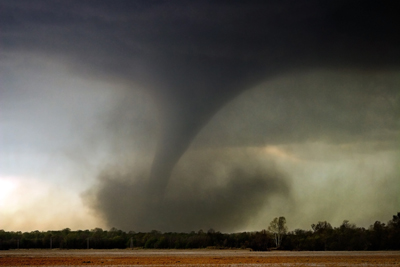Be Prepared for Tornadoes

Building an emergency kit and creating a family communication plan are vital steps for families to take well before severe weather such as a tornado strikes. (
Ready.gov offers information on how to accomplish this.) By developing a communication plan, families will know how to contact each other after the storm. There is a high likelihood that a tornado will strike at a time when family members are separated—while at work or at school. Also, part of being prepared is practicing tornado drills in your home. Make sure all family members know where to go and what to do if they are home when a tornado strikes.
Tornadoes can strike quickly. If you see one approaching, take shelter immediately.
What to do when a tornado is approaching?
- Go to a predetermined safe room or shelter area. If you have no predetermined place to go, try to find the lowest part of the building you are in and go to the center of that area. Stay away from windows, doors, and corners of buildings. If possible, get underneath a sturdy table or desk.
- Never try to outrun a tornado either on foot or in a car. Instead try to find shelter inside a building and wait out the storm. If you cannot find shelter in a building, lie flat in a ditch.
- Watch for flying debris, which causes most injuries during tornadoes.
After the tornado:
- Go outside only when you know it is safe to do so. Many injuries from these storms are caused after the storm has passed by people going into unsafe areas or walking through debris piles.
- If you believe your home has suffered structural damage, contact your local building safety inspector to have your home inspected.
- If the storm occurs during the night, use flashlights instead of candles. Striking a match could ignite gas vapors in your area.
- Keep tuned in to local weather and news stations for updated reports on damage and shelters.
Understand weather watches and warnings:
A tornado watch means a tornado is possible and could be occurring in nearby areas. Remain alert to the weather and begin to prepare to take shelter. A tornado warning means that a tornado has been spotted on the ground in your county or moving toward your county, or that weather radar indicates a high probability of a tornado existing.Post-Storm Guidance
- The Insurance Information Institute (I.I.I.) offers the following guidance to property owners in order for quick claims process after a tornado strikes:
- Be prepared to give your agent or insurance company representative a detailed description of the damage to your property. Your agent will report the loss to your insurance company or to a qualified adjuster who will contact you as soon as possible in order to arrange an inspection of the site.
- If it is safe to access the area, take photographs of the damaged property. Visual documentation will help with the claims process and can assist the adjuster in the investigation.
- Prepare a detailed inventory of all damaged or destroyed personal property. Make two copies--one for yourself and one for the adjuster. Your list should be as complete as possible, including a description of the items, dates of purchase or approximate age, cost at time of purchase and estimated replacement cost.
- Collect canceled checks, invoices, receipts or other papers that can assist the adjuster in obtaining the value of the destroyed property.
- Make whatever temporary repairs you can. Cover broken windows and damaged roofs and walls to prevent further destruction. Save the receipts for any supplies and materials you purchase to provide to your claim adjuster for possible reimbursement, depending on the provisions of your insurance policy.
- Secure a detailed estimate for permanent repairs to your home or business from a licensed contractor and give it to the adjuster. The estimate should contain the proposed repairs, repair costs, and replacement prices.
- If your home is severely damaged and you need to find other accommodations while repairs are being made, keep a record of all expenses, such as hotel and restaurant receipts.